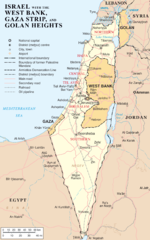Geneva Accord
From Wikipedia, the free encyclopedia
- This article is about the proposal for peace between Israel and Palestine. There was also a Geneva Accord that concerned Vietnam, Geneva Accords that concerned Afghanistan, other Geneva Conventions and other Geneva Conferences.
The Draft Permanent Status Agreement, better known as the Geneva Accord or Geneva Initiative, is an extra-governmental and therefore unofficial peace proposal meant to solve the Israeli-Palestinian conflict. It would give Palestinians almost all of the West Bank and Gaza Strip and part of Jerusalem, drawing Israel's borders close to what existed before the 1967 war. In return for removing most of the Israeli settlements in those areas, the Palestinians would limit their "right of return" to Israel to a number specified by Israel and will drop all other claims and demands from Israel.
The Accord was initiated by Professor Alexis Keller in 2002 and officially launched on December 1, 2003 at a ceremony in Geneva. Amongst its creators are Israeli politician Yossi Beilin, one of the architects of the Oslo accords, and former Palestinian Authority minister Yasser Abed Rabbo. Both noted that the Geneva accord does not obligate either of their respective governments, even though Abed Rabbo was a minister at the time of the signing.
Contents |
[edit] The Accord Content
[edit] Main Concepts
The main concept of the agreement is the establishment of a Palestinian state on the West Bank and the Gaza Strip in return for Palestinian recognition of the state of Israel as the rightful homeland of the Jewish people. The agreement puts an end to mutual claims, so that, after its signing, the conflict officially ends.
Further, the agreement obliges the Palestinians to cease all kinds of violence against Israel, including terrorism and incitement; and states that all illegal armed groups must be disarmed and disbanded.
[edit] Refugees Issue
There is disagreement over the degree to which the Accord would oblige Israel to accept Palestinian refugees. The relevant text of the Accord is Article 7, section 4.c:
- Option IV [Israel as a permanent place of residence] shall be at the sovereign discretion of Israel and will be in accordance with a number that Israel will submit to the International Commission. This number shall represent the total number of Palestinian refugees that Israel shall accept. As a basis, Israel will consider the average of the total numbers submitted by the different third countries to the International Commission.
Some claim that this would not oblige Israel to accept any refugees, while others claim that it would oblige Israel to accept some.
The issue of the number of refugees moving to Israel may be of limited importance. Only 10% of Palestinian refugees would choose to live within Israel. 54% would choose to live within a Palestinian state. These results were published, in a survey by the Palestinian Center for Policy and Survey Research, on 18 July 2003.[1]
[edit] Territory and Israeli Settlement
Palestinians will be granted most of the territory captured from Jordan during the 1967 war by Israel. Israel will annex several densely populated areas near the Green Line (such as Gush Etzion, Ma'ale Adumim which will be connected to Jerusalem via a road that would be annexed as well, similar to the situation of Mount Scopus after the 1948 Arab-Israeli War). Other cities (such as Ariel); communities, such as Hebron; and settlements will be removed and their residents will be evicted. In return for areas annexed by Israel from the West Bank, the Palestinians will receive territory of equal area adjacent to the Gaza Strip.
[edit] Support
The government of Israel rejected the agreement outright while the main opposition party, the Israeli Labor Party, neither endorsed nor rejected it, and in fact failed to make any official response. On the Palestinian side, acceptance was only slightly warmer.[citation needed]
However, according to the Geneva Initiative group a poll carried out by Israeli and Palestinian organisations in December 2006 found support for the agreement running at about 50% among members of both communities.[citation needed]
The Jerusalem Post also reported on 10 March 2008 that influential Palestinian figure Marwan Barghouti had told Israeli politician Haim Oron “that it was possible for Israel and the Palestinians to reach a final-status agreement along the lines of the Geneva Initiative”.[2]
Funding for the promotion of the Geneva Accords (which one unofficial source put at $8 million) was provided by foreign countries and private donors. The main donor countries were Switzerland, some other European countries, and Japan. No official funding information has been made public. On the Israeli side, most of the funding was used for distribution of a copy of the entire text to "every household in Israel."[citation needed]
The main organizations working on behalf of the Geneva Accords are Heskem (Geneva Initiative-Israel) on the Israeli side and their Palestinian counterpart Palestine Peace Coalition/Geneva Initiative (PPC/GI).
Former US president Jimmy Carter and US General Colin Powell,[citation needed] former Joint Chiefs of Staff, endorsed the accord and the noted progressive intellectuals Noam Chomsky and Norman Finkelstein called the accords the closest to a permanent settlement of the conflict to date.[citation needed]
[edit] Arab-Israeli peace diplomacy and treaties
- Paris Peace Conference, 1919
- Faisal-Weizmann Agreement (1919)
- 1949 Armistice Agreements
- Camp David Accords (1978)
- Israel-Egypt Peace Treaty (1979)
- Madrid Conference of 1991
- Oslo Accords (1993)
- Israel-Jordan Treaty of Peace (1994)
- Camp David 2000 Summit
- Froman-Amayreh Agreement
- Peace process in the Israeli-Palestinian conflict
- Projects working for peace among Israelis and Arabs
- List of Middle East peace proposals
- International law and the Arab-Israeli conflict
[edit] References
- ^ Results of PSR Refugees' polls in the West Bank/Gaza Strip, Jordana and Lebanon on refugees' preferences and behaviour in a Palestinian-Israeli permanent refugess agreement PSR - Survey Research Unit: PSR Polls among Palestinian Refugees]
- ^ Shas claims credit for Givat Ze'ev plan The Jerusalem Post, 10 March 2008




